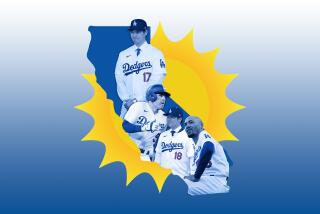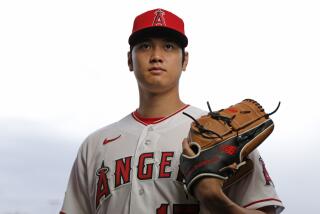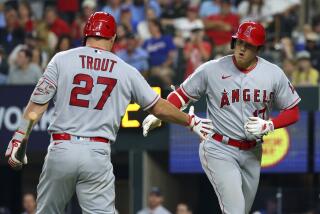California Dreaming : Shockey Comes Home to Big A--but Stay Might Be Brief
- Share via
Greg Shockey hasn’t looked at a schedule. He hasn’t felt the need.
Although he has been playing right field for the Angels’ Cactus League entrant this spring, Shockey doesn’t know where he will be come Tuesday, the scheduled start of the Angels’ season.
“That pretty much shows where I’m at,” the former Cal State Northridge standout said this week from the Angels’ training site in Tempe, Ariz. “I haven’t even thought about it.”
What Shockey knows for sure is that he will, in some way, be fulfilling a boyhood fantasy tonight when the Angels and Dodgers open the annual Freeway Series at Anaheim Stadium.
Shockey, who grew up in Orange County and attended Santa Ana Mater Dei High, used to dream of patrolling the neatly manicured grass in the outfield of the stadium he knew as “The Big A.”
That much is likely to come to pass. Shockey, who is among 36 players the Angels will have in uniform tonight, has been a familiar figure in right field this spring. A final cut to 32 will be made Saturday night before the team opens the regular season at home Tuesday afternoon against the Milwaukee Brewers.
If the major league players’ strike is not settled by then, there is a chance Shockey might make the cut and still not play for the Angels. As of Wednesday, the club had not asked whether he was willing to become a replacement player, and he wasn’t saying.
“I don’t know what the situation is,” Shockey said. “No one has talked to me about it and I haven’t made up my mind.”
Which is not to say the topic is not weighing heavily in his thoughts. He approached Angel Manager Marcel Lachemann and received a patent reply. Shockey was advised to concentrate on capitalizing on his opportunity to be seen by big league coaches this spring.
That much, he feels, has been accomplished. Shockey has played in 22 of the Angels’ 24 games and is batting .255 with a home run and 11 runs batted in.
“Just the chance of being viewed by the (coaching) staff every day has been great,” Shockey said.
The Angels are Shockey’s third organization in four professional seasons. Despite establishing Northridge career records for hits, runs, doubles, RBIs, sacrifice flies and walks, he was not drafted after either his junior or senior seasons .
He signed as a free agent with the Seattle Mariners and batted .300 or better his first two seasons in the minors before he was traded to the Minnesota Twins for Steve Ontiveros, a journeyman major league pitcher.
Shockey lasted one season with the Twins, an experience he describes in derogatory terms. “Let’s just say the grass isn’t always greener,” he said.
After Minnesota released him, Shockey caught on with the Duluth-Superior (Minn.) Dukes of the independent Northern League, for whom he batted .301. The Angels signed him this winter, but only after the commissioner’s office was called in to mediate a disagreement between Duluth-Superior and the Chicago Cubs over Shockey’s services.
The Cubs thought they had agreed to purchase Shockey’s contract when, at the last minute, the Angels outbid them. “But that problem was pretty much small potatoes compared to the whole baseball situation,” Shockey said. “I don’t think the big subject around the commissioner’s office was, ‘What are we going to do about Greg Shockey?’
“It took a while to sort out.”
Shockey refers to those weeks of waiting as “another screwed-up chapter in my career.”
His experience since joining the Angels has been more pleasant. The Angels , he said, have “been first class.”
“No one in the organization has put any pressure on any of us,” Shockey said. “They’ve just told us to go out and play hard, and that’s what we’ve done.”
Shockey said he believes he has given a good account of himself, despite what for him is a rather sub-standard batting average. “I don’t think my average shows how I’ve hit. I’ve shown some power the opposite way and showed some pull power. I even have a sacrifice bunt to go with a double, a triple and a (home run).
“Hopefully, I’ve shown them I’m pretty intense about my job.”
Apparently so.
A few days ago an Angel public-relations specialist was introduced to Shockey..
“Your face is so serious you look like you could eat newborns,” she said. Even Shockey, whose intensity is legendary at Northridge, had to laugh.
Just last Sunday he provided the highlight of a 6-4 Angel exhibition victory over the Seattle Mariners at Tempe Diablo Stadium, sprinting an estimated 40 yards to make a diving, backhand grab of a fly ball.
Shockey made the catch in foul territory, skidding to a halt within a few feet of the stadium wall after somehow managing to avoid about a dozen players and coaches in the Angel bullpen.
When Angel broadcaster Bob Starr commented that many players would have shied from such an attempt, Shockey replied, “If you slow up, that’s when injuries happen. I’ve never been hurt going all out.”
But anyone who followed Shockey at Northridge knows better.
In addition to leaving his imprint in the Northridge record book, Shockey’s hustle resulted in smudges on the cement outfield wall at Matador Field and in dents in fences elsewhere.
As a sophomore, he injured muscles and ligaments in his right shoulder when he slid into the fence during a game at Cal Poly San Luis Obispo. Northridge was trailing by 10 runs at the time.
Baseball, Shockey style, always has been a contact sport. In a Northridge game against Cal State Los Angeles, he once left two opposing players sprawled in the brick dust on one eventful trip around the bases.
Cal State L.A.’s coach, John Herbold, later showed his admiration by voting for Shockey as conference player of the year. No small compliment considering Shockey, because of injuries, missed three games against Herbold’s team and had only two hits in nine at-bats.
Shockey’s only complaint about big-league baseball stems from its rather conservative form of play.
On a base hit to right field with runners on first and second and fewer than two out, major leaguers rarely throw home, or even to third. Most often, they lob the ball in to second, conceding an extra base but maintaining the chance that the next batter might be coaxed into grounding into a double play.
Many of the mistakes replacement players have made have been born of exuberance and inexperience. “They’re heat-of-the-battle type things,” Shockey said. “You try to go for things and take a chance without really thinking it all the way through.”
The trade-off is extraordinary hustle. “There’s a genuine passion for the game,” Shockey said.
The prospect of playing so close to home, in a stadium he used to visit, makes the experience that much more appealing.
“I always really felt I’d be there someday,” Shockey said. “Of course, I was hoping it would be under different circumstances.”
More to Read
Go beyond the scoreboard
Get the latest on L.A.'s teams in the daily Sports Report newsletter.
You may occasionally receive promotional content from the Los Angeles Times.







